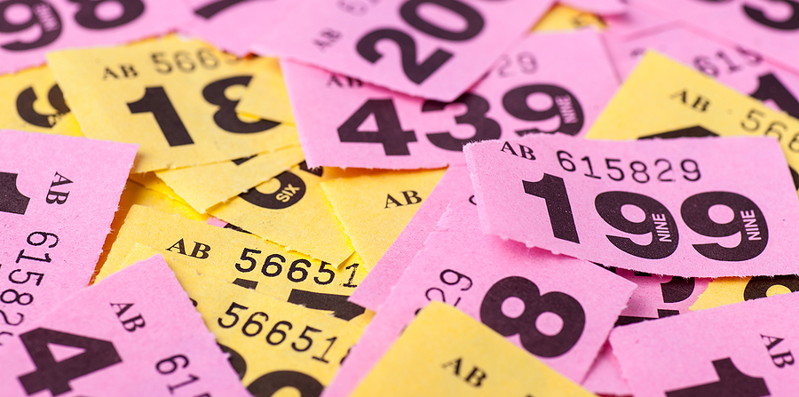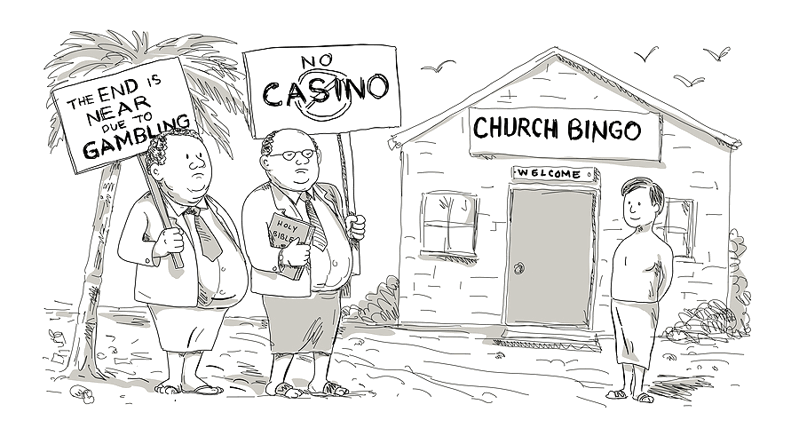![]() Most people gamble because they want to try to win money or a prize. Gambling is seen as something that players often do for very selfish reasons. Donating to charity, volunteering as a charity worker or participating in church fundraising, however, generally happens out of selflessness. They’re opposite ends of the spectrum.
Most people gamble because they want to try to win money or a prize. Gambling is seen as something that players often do for very selfish reasons. Donating to charity, volunteering as a charity worker or participating in church fundraising, however, generally happens out of selflessness. They’re opposite ends of the spectrum.
Still there are links between the two. The majority of people gamble for enjoyment and see their stake as in effect a ‘fee’ for the heightened anticipation they get when they win a prize. Most people accept that the odds are not in their favour and that they are more likely to lose than win.
When charities and churches run gambling events or lotteries they are doing so to raise money, obviously, but they also know that providing enjoyable games and a sense of anticipation can help in getting people to come and donate money.
Unfortunately, though, not everyone gambles for enjoyment and there are a lot of compulsive gamblers with addictions or those recovering from addiction. This, therefore, begs the question as to whether gambling, charities and churches should mix? Is it a moral thing to do?
The Chance to Raise Money
 When we say that charities promote gambling, we don’t mean things like casino gaming. You wouldn’t find a charity promoting an online sportsbook or gaming site, for example. Charities gain nothing from doing this and gambling sites can gain everything. It would be a very one-sided arrangement. But they do have a tendency to promote gambling in general.
When we say that charities promote gambling, we don’t mean things like casino gaming. You wouldn’t find a charity promoting an online sportsbook or gaming site, for example. Charities gain nothing from doing this and gambling sites can gain everything. It would be a very one-sided arrangement. But they do have a tendency to promote gambling in general.
This is because charities have the opportunity to raise money from doing so. English writer Jeanette Winterson CBE once said:
“Gambling is not a vice; it is an expression of out humanness. We gamble. Some do it at the gambling table, some do not. You play, you win, you play, you lose. You play.”
It has been common for people throughout history for people to gamble. Some may look upon it as being harmful, yet it can actually do good as well when used in the right context like a charity fundraiser. Gambling is also controlled with the laws in place to regulate gambling in the UK today.
Charitable gambling organisations are on-board with these regulations, too. It is through these regulations that charities can receive much-needed donations from gambling. The Health Lottery is an example of this in action.
On the streets, you can often find people asking for monetary donations. While some are obvious scammers, others are for genuine charities. But it isn’t common for people to want to give their money to people on the streets. Most of us will walk past them or answer with a quick “sorry, I don’t have any spare change”.
A lot of that has to do with the fact that it is so easy for charity scammers to set up shop. They request money on the streets, stating that it is for a legitimate charity. And in the end, your money goes towards funding various other things.
Even recently, an investigation by the BBC into Ukraine war charities uncovered scams. Online scammers were using hundreds of fake charity websites. They tricked people into donating to the Ukraine war fund. Some of them even pretended to be giving equipment to soldiers fighting in the country. One bogus site claimed to have raised £80,000. It belonged to a man based in Abuja, Nigeria.
It is easy to see why people would be hesitant to donate to charities on the street. It is difficult to know whether they are legitimate organisations. And further to this, people don’t often know what their donated money is used for.
Yet if charities offer some form of gambling, people consider it to be different. Gambling means that players stand the chance of being successful. And the money that they spend on charity gambling options goes to the charity.
Both sides benefit in this scenario, rather than one taking advantage of the other. The charity gets a part of the money spent on its provided game(s). And the donator has the opportunity to win a pot or other reward from playing.
This is why there are so many charitable lotteries and games out there. It is also true when charities hold fundraising events at county fairs or other local events. By offering raffles, tombolas and other games of chance people are enticed to donate to them in a much easier way than raising money off the streets or via advertising campaigns.
A Rapid Rise in Charity Gambling After WWII

Charitable gambling has been around for a considerable length of time and it’s not a new activity. But the popularity of gambling as a means to make money grew following World War II.
Many operators such as the football pools and sweepstake operators tried to raise money for good causes. This included hospitals, sports, health-related charities and education. The war had decimated funds in a lot of areas and through charity gambling activity it helped money flow into these sectors.
Today, many more people are aware of charitable gambling. And this comes in various forms, too. From simple church tombola stalls through to The National Lottery. All have a connection to charitable causes.
The National Lottery, for example, raised £1.88 billion for good causes across the UK in 2020-21. That marked an increase of about £30 million on the previous year. Would the same amount be in the records without a lottery?
The likelihood is that less would be on the record books from only asking people to donate. Because there is a chance of receiving a payout from the lottery, it appeals to more people. And this is why charities promote gambling activity across the country.
Yet there is usually a difference between standard gambling and charitable gambling. Charity lotteries often have the following characteristics:
- They are privately operated and have no political interference.
- There is no retention of profits for the operator, all money goes to the cause
- The donation of a large part of the funds goes to the charities involved. The rest goes as prize money. Any operational costs of such a lottery should not exceed 20% of the turnover.
- Provides long-term funding prospects, serving as a reliable partner of the charity.
- Has low stakes
Through this, charity gambling is an incentivised giving method. Supporters of the charity receive rewards. Donations are more likely from those people who may not otherwise offer support.
Many philanthropists have a liking for this type of fundraising. It provides a “predictable way of generating income”, according to Lorraine Bilton.
What Are The Rules For Charitable Gambling In The UK?
 An organisation in the UK is able to apply for a permit to be able to hold gambling events. This is as long as a part of the proceeds go to charity.
An organisation in the UK is able to apply for a permit to be able to hold gambling events. This is as long as a part of the proceeds go to charity.
The charity organisation will often oversee the event itself. And it doesn’t have to take place on registerd gambling premises, either. Don’t expect incentivised giving to take place within casinos. Events may use casino games like roulette for donators, but it doesn’t have to occur on those sites.
By law, the UK government allows charities to hold their own lotteries or tombolas. The charity must receive at least 20% of the value of the tickets sold. Let’s say that a ticket sells for £2. The charity must receive at least 40p of that amount. It is up to the charity itself to determine whether it should receive more. Anything remaining goes to the prize pot or towards printing more tickets etc.
Charity gambling of this nature is a lot more regulated, though. This is to prevent the outright abuse of it. The prizes for playing in charity gambling games are also limited. The National Lottery jackpot can reach lofty heights. But when it comes to charity lotteries, there will be a limit to how much money is available.
In this respect, you shouldn’t expect to be be winning large prizes and in the end, the priority of these games is to raise funds for charity.
Religion and Gambling

One of the touchier subjects has been the link between gambling and religion. For all intents and purposes, it is common to believe that religions look down upon gambling. But lotteries can be an appealing fundraising option for churches.
That’s not to say that all churches and religions get behind it as a useful tool. But some do it so that they can raise money for various religious deeds.
Churches can often provide private society lotteries in this instance. To qualify as such, two rules are in place. They are:
- Tickets should only be sold to people on the electoral roll. Any worshippers not on this are not eligible to take part.
- The sale of tickets is only legal on church premises. The sale of them on the streets or at people’s homes is not permitted.
Yet it is the case that many churches need to sell tickets to anyone and everyone they can. This means that it would not qualify as a private society lottery. Instead, the small society lotteries ruling comes into play. Proceeds cannot go above the £20,000 per draw limit. Meanwhile, the total proceeds from the lotteries per year cannot exceed £250,000.
There is no need for a small society lottery to register with the UK Gambling Commission. Yet it is a rule to register with the local district council. This costs £40 to do and has a £20 renewal fee every year.
Raffles are also sometimes provided by churches, and even by charities, too. These are often held at outdoor gatherings or summer fêtes, for example. Under law, they go by the name of incidental lotteries. These do not need registering with the Commission or local council. The following rules are in place, though:
- The sale of tickets can only take place during the event and on the premises.
- The sum total of prizes taken from ticket sales must not exceed £500. Any donated prizes do not count towards that total amount.
Does this type of gambling go against religion, though? Well, in the Bible, there are references to casting of lots. This relates to the rolling of dice to make unbiased decisions. In Exodus, Joshua rolled dice to determine where 12 tribes would settle disputes.
According to some gospel writers, gambling took place at the crucifixion of Jesus. Roman soldiers were rolling dice to determine who would get his clothes once he died. Thus, the Christian religion doesn’t tend to lean against the act of gambling. If it did, the likelihood is that churches wouldn’t be using it as a method of fundraising.
Gambling is usually considered as forbidden in other religions, such as Islam. Hinduism also projects the same sort of opinion on gambling of any kind.
Generally speaking, this is due to the belief that a person should not be wasteful with money. Instead, they should appreciate the reception of it after working hard to gain it. In the context of giving money through gambling rather than gambling with the sole motivation to win money for yourself, it is possible for many religious bodies to justify its use.
Is it Bad for Charities/Religions to Promote Gambling?
![]() It would be right to ask whether charities should actually be promoting gambling. It is an activity that has affected some people in very a bad way. Many problem gamblers live in the United Kingdom. And while some of them are receiving help for their problem, do charities send the wrong message?
It would be right to ask whether charities should actually be promoting gambling. It is an activity that has affected some people in very a bad way. Many problem gamblers live in the United Kingdom. And while some of them are receiving help for their problem, do charities send the wrong message?
The promotion of gambling so that they can raise money could affect such a person. It’s likely that this isn’t the intention of charities offering gambling activities. Of course, they’re trying to fundraise. And this occurs as a selfless act.
In the end, it could have the adverse effect on problem gamblers. If they see a charity providing lotteries or raffles, they may end up having a go. For many people, these games are a simple form of entertainment. For the charity, it offers a chance to generate money. But for a problem gambler, it could be the start of a slippery slope. It only takes one go at a charity lottery and someone could find themselves gambling a lot more money through bookmakers and casinos.
Whether you think charity gambling is a good thing or not, it is likely here to stay. The funds raised from such is too much for charities to miss out on. And while the law says that such activities are legal, there’s nothing to stop them. The link between gambling and charities will continue in the United Kingdom.
